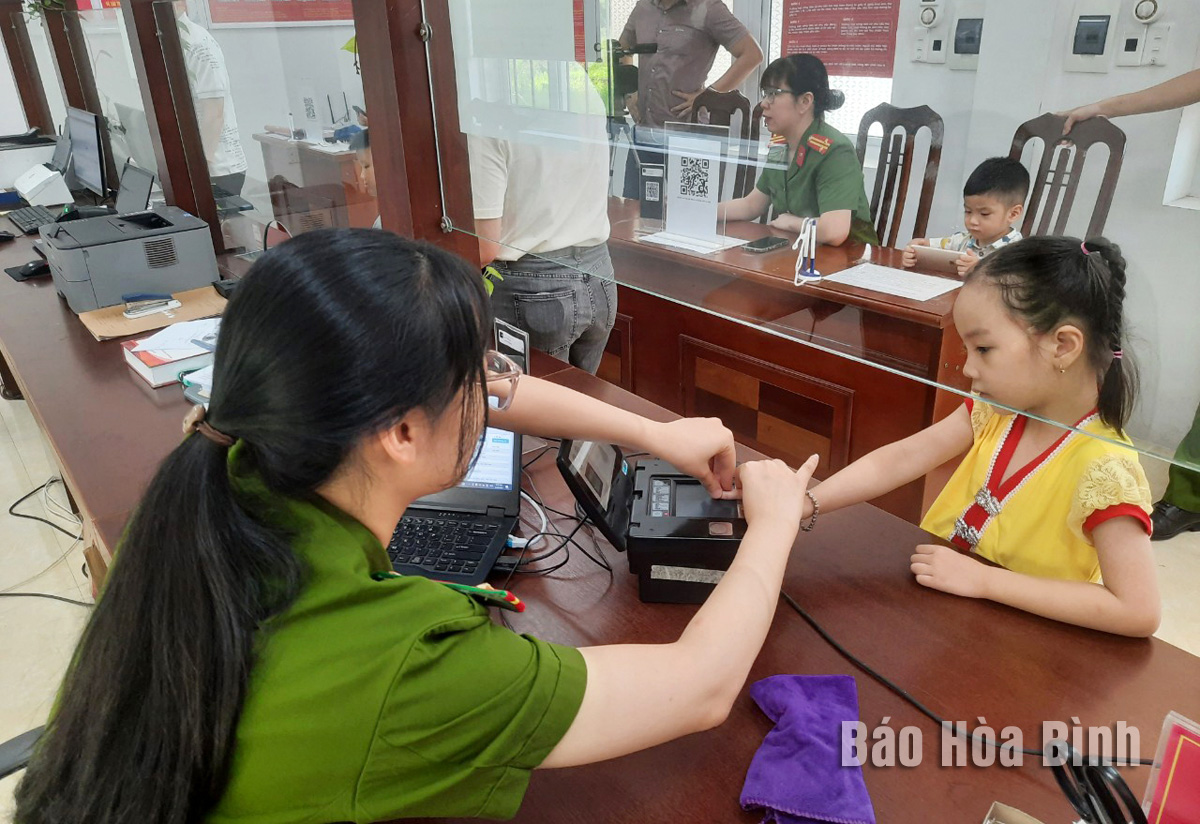
According to the Office of the People’s Committee of Hoa Binh province, Hoa Binh ranked first among the 63 localities across the nation in processing administrative requests online in July by recording 83.08 out of the 100 points, leaping three places from June. The ranking was based on the ratings in the National Public Service Portal at dichvucong.gov.vn.

Since July 1, 2024, the Police Office for Administrative Management of Social Order has enhanced the service quality in receiving dossiers for issuing ID cards following the new ID Law.
Specifically, the locality scored 15.7 out
of the total of 18 points in openness and transparent criteria. The province
harmonised 17,675 dossiers on the National Public Service Portal.
At the same time, Hoa Binh recorded 18.7
out of the total of 20 points in terms of dossier processing progress, up 0.1
points over June. Meanwhile, its scores in public service provision procedures
reached 7.9 out of the 12 points, an increase of 0.4 points compared to June.
The rate of online application submission in Hoa Binh reached 67.54% in July.
Hoa Binh processed 99.3% of public service
requests on time. It earned 9 out of the 10 points in online payment. The rate
of administrative procedures requiring financial obligations provided on the
National Public Service Portal was 352, reaching 87.56%. Online payment was
applied for 13,392 dossiers, reaching 86.76% of the total number of dossiers.
Particularly, Hoa Binh scored 18 out of the
18 points in the level of satisfaction, maintaining the result in June. Its
scores in digitalising dossiers were 13.8 out of the 22 points, up 0.2 points
compared to June.
Hoa Binh province is undergoing a dynamic transformation amid Vietnam’s national digital transition. Building on Poliburo’s Resolution No. 57-NQ/TW on breakthroughs in science, technology, innovation, and national digital transformation, the province has rolled out a wide range of practical action plans. A standout initiative is the "Digital Literacy for All” movement, an effort to ensure that no one is left behind in the digital era.
Hoa Binh province is undergoing a dynamic transformation in the wake of the national digital transformation movement. Building on Resolution No. 57-NQ/TW of the Politburo on breakthroughs in science, technology, innovation, and national digital transformation, the province has implemented a wide range of practical action plans. A standout initiative is the "Digital Literacy for All” movement ambitious effort to ensure that no one is left behind in the digital age.
With a spirit of unity and proactive problem-solving, the Party Committee, the government and the people of Dong Lai Commune (Tan Lac District) have made great strides in implementing the resolutions of the 24th Party Congress of the commune for the 2020 - 2025 term. Focusing on leadership and practical actions, the commune has brought the Party’s resolutions into daily life, creating strong impacts and pushing the local development forward.
Amid the nationwide push for digital transformation, young people in Hoa Binh Province are stepping up as dynamic pioneers, applying technology to enhance Youth Union operations and expand the reach of youth-led initiatives. Through creativity and adaptability, Youth Union organizations at all levels have introduced a series of practical solutions, contributing to modern governance and community development.
In recent years, An Nghia commune, located in Lac Son district, has stepped up administrative reform, focusing on improving the quality and efficiency of its single-window service unit for receiving and processing administrative procedures. These improvements have helped create favourable conditions for local residents and organisations to handle administrative procedures, contributing to the commune’s broader socio-economic development.
The Prime Minister-approved master plan to develop the multi-use value of forests ecosystems through 2030, with a vision to 2050, aims to improve the management and sustainable use of forest resources, create jobs, increase incomes, and improve the living standards of ethnic minorities, people in mountainous and remote areas, forest workers and those living near forests.



